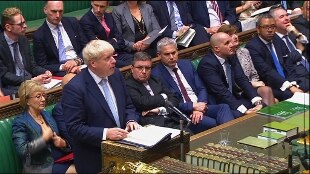- Brexit, Johnson: "Whatever happens, on October 31 we leave the EU"
- United Kingdom, Johnson: "I do not resign to avoid an extension of the Brexit"
- Brexit. Parliament reopens, Johnson challenges him to vote for mistrust
- Brexit. European car companies: no deal would be an earthquake
Share
03 October 2019The Johnson doctrine in managing the United Kingdom's complex exit from the European Union is clearly outlined. The British government "has done everything possible" in the hope of reaching an agreement with the EU on Brexit, "showing great flexibility": if Brussels does not do the same, then London will come out on October 31st without an agreement. This is the "statement", the declaration of the British premier before the Municipalities, the day after the presentation to the EU of an alternative plan to avoid the backstop between Northern Ireland and Ireland.Johnson said that it is important that Brussels is aware that this is "our will" and that "we are ready", in the case, to the no deal.
His words were welcomed by the murmurs of the opposition, like his reassurances on the impact of the plan on Northern Ireland.
Financial Times, Boris's bet
Boris Johnson's plan for an agreed Brexit is "his biggest bet, and his prime ministerial career may depend on it." The Financial Times warns the British prime minister, calling him to "face the reality" and inviting him, if Brussels rejects him, not to go to the no-deal but to "seize the seeds of compromise contained in the plan , and redouble efforts for a negotiated solution ". It is true that such a proposal, which removes the backstop by imposing not one but two boundaries, allows Johnson to hold the party together, but it is equally true that in this way there is the risk of causing buried tensions to revive 30 years ago from the Good Friday agreements. Furthermore, the financial newspaper argues, the Northern Ireland parliament, called to decide in 2025 on how to proceed with respect to the borders, "has not met for two years". And besides, the prime minister, once he rejected the plan from Brussels, could see himself forced by Parliament, through the Benn Act, to ask for an extension. Such a "humiliation" "would vanish if the prime ministers succeeded in getting an agreement. And the voters will decide accordingly in the next election".
The Johnson plan does not convince Barnier
The new plan proposed to the EU by British Prime Minister Boris Johnson does not seem to have convinced Michel Barnier, chief negotiator of Brussels for Brexit, who in private would have confided to his parents to fear "a trap". The project revealed by the British leader foresees that Northern Ireland leaves the customs union at the end of the transition period together with the rest of the United Kingdom, thus resuming customs controls on the Irish island; in parallel, however, the Northern Irish province would remain in the single market, aligned with the European rules on goods, but only if the Belfast Parliament votes in this sense by December 2020 (since 2017 that does not meet after the government collapses due to disagreements) between Dupe Unionists and Sin Fein Republicans): A similar vote will be held every 4 years. The role of Stormont, as the Northern Irish Assembly is called, raises concerns in Barnier, reports the Guardian: in the event of a negative vote by Northern Irish parliamentarians on the agreement, in 2020 or later, "the EU would remain trapped without any backstop to preserve the single market after Brexit, "the EU chief negotiator privately commented.

